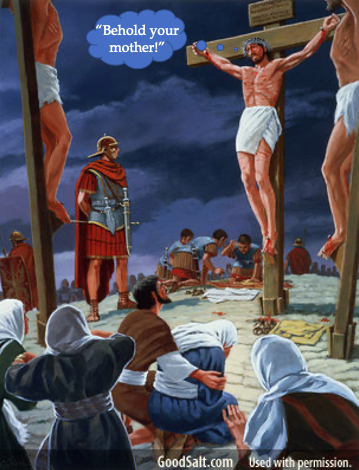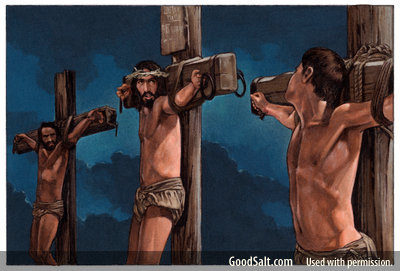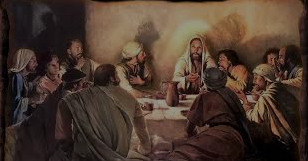“When Jesus therefore saw His mother, and the disciple whom He loved standing by, He said to His mother, ‘Woman, behold your son!’ ” John 19:26
During the global pandemic, we have experienced the pain of separation from family and friends due to COVID restrictions. Many people are feeling alone, forgotten, and uncared for. But in today’s verses from John 19, we discover a very powerful lesson that speaks to this challenge in our lives.
For the past several days, we have been looking at lasting lessons from the last day in Jesus’ life before His dead body is sealed in a tomb. These lessons include the following:
– Like Pilate, we can avoid doing the right thing because of the cost involved (John 19:4-7).
– No one has power in this world except what is given to them by God (John 19:8-12).
– The closer we get to the cross, the more clearly we see who people really are, including ourselves (John 19:13-16).
– The cross is the total expression of God’s grace to us in Christ (John 17-18a).
– The two crosses teach that God gives each of us the freedom to choose (John 19:18b).
– There is no person or language God will not use to proclaim who Jesus is (John 19:19-22).
– Jesus’ garments were removed so we could wear the garments of salvation (John 19:23-24).
Today we learn that THOUGH JESUS DIED FOR THE WORLD, HE ALSO CARES DEEPLY FOR ME (John 19:25-27). The apostle John is the only gospel writer who records this next scene at the cross. Even while dying on a cross Jesus thought of others. William Barclay writes, “There is something infinitely moving in the fact that Jesus in the agony of the cross, in the moment when the salvation of the world hung in the balance, thought of the loneliness of his mother in the days when he was taken away.” 1
“Now there stood by the cross of Jesus His mother, and His mother’s sister, Mary the wife of Clopas, and Mary Magdalene.” (John 19:25). These four women who “stood by the cross of Jesus” contrast with the four Roman soldiers who divided Jesus’ garments (John 19:23-24). “While the soldiers behaved callously and profited immediately from Jesus’ death, the women waited faithfully and patiently for what God would do.” 2
Might I also add that Jesus’ disciples were not present at the cross (Matthew 26:56, 75), except for the apostle John, “the disciple whom He loved” (John 19:26). Their promise to remain faithful to Christ even in death was soon abandoned when Jesus was arrested (Matthew 26:35) – which leads me to admire the faithfulness of these women all the more.
Exactly who were these women? John mentions Jesus’ “mother” first. None of the other gospel writers refer to Mary in their accounts of the cross. Imagine the ache in her heart as she watched her Son writhe in pain on the cross. No mother wants to see her child suffer such agony. “The anguish of Jesus’ mother fulfilled a prophecy of Simeon: ‘A sword will pierce your own soul too.’ (Luke 2:35).” 3
Erwin Lutzer has captured what Mary might have felt as she stood before the cross:
“She who had planted kisses on the brow of that little Child now saw that brow crowned with thorns. She who had held those little hands as He learned to walk now saw those hands pierced with nails. She who had cradled Him in her arms now saw Him writhing alone on the garbage dump of Jerusalem. She who loved Him at birth came to love Him even more in death.” 4
John also tells us that the “sister” of Jesus’ mother is present as well. We learn from Mark that her name is “Salome,” the wife of Zebedee and the apostle John’s mother (Mark 15:40). 5 So she would be Jesus’ maternal aunt.
Next is “Mary the wife of Clopas,” the “mother of James the Less and of Joses [Joseph]” (Matthew 27:56; Mark 15:40), the husband of Jesus’ mother. 6 And finally there was “Mary Magdalene,” the woman from whom Jesus “had cast seven demons” (Mark 16:9). So we have biological and spiritual family grieving as they watch Jesus suffer. They had been with Jesus in the joys of life and now they desired to be with Him in the pain of death. These faithful friends remained with Jesus when He needed them the most. “We all need – and need to be – friends like this.” 7
What happens next is amazing considering how agonizing suffering usually causes the sufferer to draw within to preserve his own life. But Jesus is no ordinary Person. Even when He is in severe pain, He is still thinking of others. “When Jesus therefore saw His mother, and the disciple whom He loved standing by, He said to His mother, ‘Woman, behold your son!’ ” (John 19:26). Why does Jesus wait until now to speak to His mother?
We saw in the previous picture that the Roman soldiers took Jesus’ seamless tunic undergarment and cast lots for it (John 19:23-24). Normally this tunic was given to the son by his mother. Some think that Mary gave Jesus this tunic when He left home. 8
Charles Swindoll observes that there seems to be a correlation between what the soldiers were doing (John 19:23-24) and the words of Jesus in the presence of Mary (John 19:25-27). Swindoll writes, “Why now? She’s been there all along, watching and weeping. Why hasn’t He acknowledged or spoken to her? Could it be because of the seamless tunic? I think so. His outer garments were insignificant…. But when they touched the tunic, they touched something very near to His heart—the garment made for Him by His mother.” 9
When Jesus “saw His mother” He says to her, “Woman, behold your son!” This may be understood in the sense, “Consider him as your son to take care of you.” 10 It is interesting that Jesus never addresses Mary as His mother. He refers to her as “Woman” here and at the wedding feast in Cana (cf. John 2:4). Could it be that Jesus is reminding her that He is her Savior and not merely her Son?
“Wonderful mother that she was, she nevertheless took her place with the other sinners at the foot of the cross. She was not there to aid in purchasing redemption, but she herself was being redeemed by her Son. In the lovely poem we call the Magnificat, composed after she discovered she was pregnant, she said, ‘My soul glorifies the Lord and my spirit rejoices in God my Savior’ (Luke 1:46–47, emphasis added). She too needed the forgiveness her Son was now purchasing.” 11
Christ knew that “the disciple whom He loved” would faithfully provide for His mother. “Then He said to the disciple, ‘Behold your mother!’ And from that hour that disciple took her to his own home.” (John 19:27). So John took Mary to his home “that hour,” implying that he cared for her as his own mother. He brought the one – whose soul the sword would pierce – away from the terrible scene of her Son’s suffering to the shelter of his home. John’s temporary absence may explain the lack of all the details that are recorded in the other gospels prior to the closing scene. 12
Because Jesus assigned John to care for His mother, it is assumed that Joseph, Mary’s husband had already died. Even as Jesus hung dying on a cross, then, He fulfilled His obligation to care for His widowed mother (cf. Exodus 20:12; I Timothy 5:3-8). “Jesus entrusted the well-being of His mother to John rather than to one of her biological sons because they had not yet believed in Him (see 7:5). Spiritual relationships are to take precedence over biological and physical relationships (see Matt 12:46-50).” 13
God wants the church to support widows who are in genuine need, who have no family support, and who serve God and His people with prayers and a life that is above reproach (I Timothy 5:3-8).
This scene at the cross teaches us that while Jesus dies for the world, He still remembers the individual. As He is dying on the cross, Jesus looks at the individuals killing Him and prays, “Father, forgive them, for they do not know what they do.” (Luke 23:34). While Jesus is dying for billions of people, He looks at the thief beside Him who was suffering and says, “Assuredly, I say to you, today you will be with Me in Paradise.” (Luke 23:43). As Christ hung dying an excruciatingly painful death, He looks at His mother and His beloved disciple and says, “John, you are the one to take care of My mother.”
Christ is still the same today. He loves the world, but He also cares about me. He cares about my individual needs. He cares about my life. And He gives me the encouragement that I need.
Prayer: Lord Jesus, we live in such an impersonal world where it is easy to feel all alone and forgotten. Thank You for reminding me today that You not only died for the world, but You also care about the individual. You are such an amazing Savior to show such great compassion to Your mother as You agonized on the cross. You knew You would be leaving her to return to heaven, so You provided another son to take care of her. Thank You for caring about every aspect of my life and those who are close to me. Use me, I pray, to be Your voice of compassion and love especially to those who are broken and all alone. In Your mighty name I pray, Lord Jesus. Amen.
ENDNOTES:
1. Erwin Lutzer, Cries from the Cross: A Journey Into the Heart of Jesus (Moody Publishers, Kindle Edition, 2002), pg. 72 cites William Barclay, The Gospel of John, Vol. 2, The Daily Study Bible (Edinburgh: St. Andrew, 1965), pg. 299.
2. Tom Constable, Notes on John, 2017 Edition, pp. 354-356.
3. Edwin A. Blum, The Bible Knowledge Commentary Gospels, Editors John F. Walvoord and Roy B. Zuck, (David C Cook, 2018 Kindle Edition), pp. 691-692.
4. Erwin W. Lutzer, Cries from the Cross, pg. 76.
5. J. Dwight Pentecost, The Words & Works of Jesus Christ, (Grand Rapids: Zondervan, 1981), pg. 485, cites Alfred Edersheim, The Life and Times of Jesus the Messiah (New York: Longmans, Green, 1912), pp. 601-603.
6. Ibid.
7. J. Carl Laney, Moody Gospel John Commentary (Chicago: Moody Press, 1992), pg. 347.
8. Erwin W. Lutzer, Cries from the Cross, pp. 72-73.
9. Erwin W. Lutzer, Cries from the Cross, pg. 73 cites Charles Swindoll, The Darkness and the Dawn: Empowered by the Tragedy and Triumph of the Cross (Nashville: Word, 2001), pp. 153-154.
10. Laney, Moody Gospel John Commentary, pg. 348.
11. Erwin W. Lutzer, Cries from the Cross, pg. 78.
12. J. Dwight Pentecost, The Words & Works of Jesus Christ, pg. 485 cites Alfred Edersheim, The Life and Times of Jesus the Messiah (New York: Longmans, Green, 1912), pp. 601-603.
13. Tony Evans, CSB Bibles by Holman. The Tony Evans Bible Commentary (B & H Publishing Group, Kindle Edition, 2019), pg. 1824.




